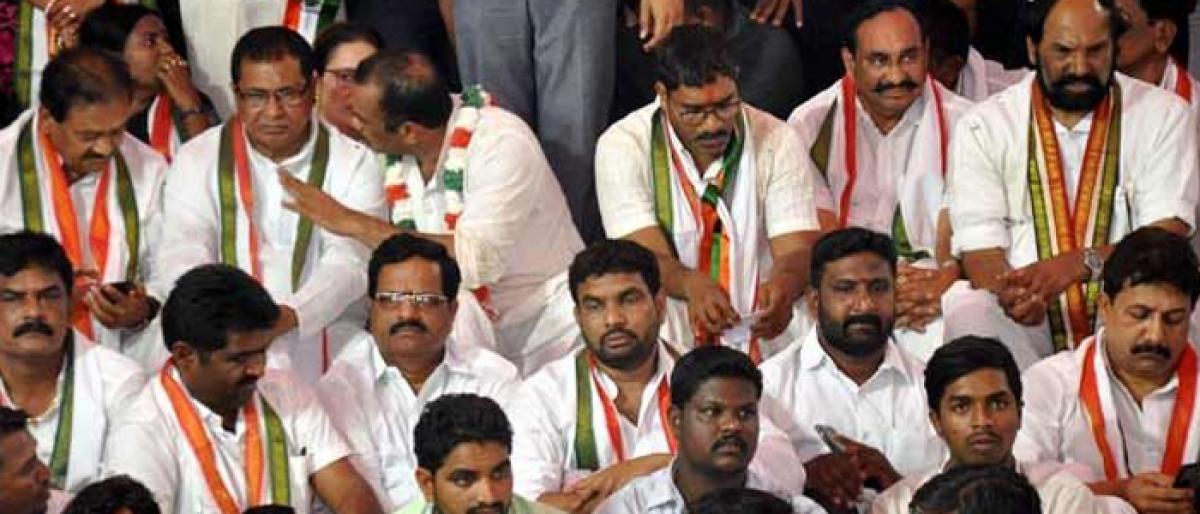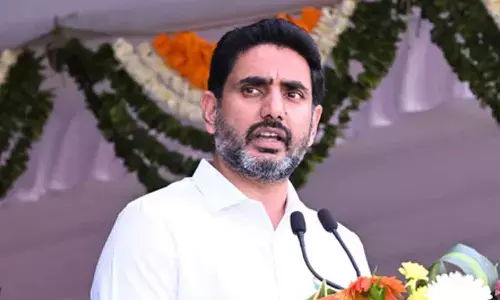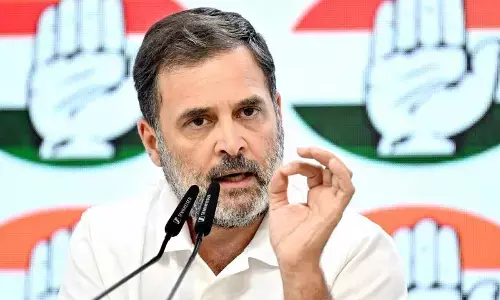It’s high time for nation-wide debate

The Hyderabad High Court visibly unhappy over nonimplementation of its orders in restoring the Assembly membership of two Congress legislators, expelled from the House, hinted at summoning Secretary Legislature and Law Secretary of Telangana State, besides impleading Speaker S Madhusudhana Chary in the contempt case filed by expelled legislators The Court also reminded about its decision to sus
The Hyderabad High Court visibly unhappy over non-implementation of its orders in restoring the Assembly membership of two Congress legislators, expelled from the House, hinted at summoning Secretary Legislature and Law Secretary of Telangana State, besides impleading Speaker S. Madhusudhana Chary in the contempt case filed by expelled legislators. The Court also reminded about its decision to suspend the resolution of Assembly that expelled the petitioners, which was upheld by the division bench too.
The judge hearing the case said, despite these orders, the non-restoration of the membership of the petitioners, not paying them salaries and not restoring their security cover amounted to the contempt of court. The judge said that there was prima facie contempt against the legislative secretary and law secretary.
We are yet to know the later developments on this. Meanwhile, the Assembly and Law Secretaries filed appeals before a division bench of High Court, who set aside the expulsion order of the Assembly as well as the gazette notification of government notifying the vacancy. They stated that they have no role to play in the implementation of the earlier order of the single judge. Whether this leads to a clash or confrontation between the judiciary and the legislature is a million-dollar question. It seems that it is high time for a nationwide discussion on checks and balances in a parliamentary democracy.
It may be worthwhile to analyse the powers and functions of Legislature and to what extent the judiciary has an overriding power on matters decided by Legislature and vice versa. The Constitution divided the Government into three branches: legislative, executive, and judicial. That was an important decision because it gave specific powers to each branch and set up something called checks and balances. Just like the phrase sounds, the point of checks and balances was to make sure no one branch would be able to control too much power, and it created a separation of powers.
In this context, Article 212 of the Indian Constitution categorically says that “Courts not to inquire into proceedings of the Legislature. The validity of any proceedings in the Legislature of a State shall not be called in question on the ground of any alleged irregularity of procedure. No officer or member of the Legislature of a State in whom powers are vested by or under this Constitution for regulating procedure or the conduct of business, or for maintaining order, in the Legislature shall be subject to the jurisdiction of any court in respect of the exercise by him of those powers”. This implies that the courts cannot inquire the validity of the proceedings of the legislatures.
The Constitution lays down the structure and defines the limits and demarcates the role and functions of every organ of the state, including the judiciary, and establishes the norms for their inter-relationship, checks and balances. A number of occasions have come in the parliamentary history of our country when there is a tug of war between the legislature and the judiciary. The Government many a times even objected to the supremacy of courts on the ground that, how the unelected judges could invalidate those laws made by the elected members of Parliament.
It is obvious that the conflict between the judiciary and Parliament about the constant enhancement of their respective powers has grown with the passage of time. The opinion of the people is supreme in a democracy. The people are sovereign, and their power cannot be reduced but the people themselves do not use this power. They use it through their elected representatives. If the people themselves use their sovereign power, lawlessness will spread in the country. Thus the sovereignty of the people has been changed into the sovereignty of legislature.
It can be said that the unelected judges availing so many powers and refusing to heed the intentions of the elected representatives is undemocratic. But it is also true that the division of powers among the organs of government is the fundamental feature in the Constitution of India and this should be maintained. However, the unelected Judges have effectively replaced the notion of the separation of powers among three government branches.
Just as parliament is supreme in Britain, similarly the Constitution is made sovereign in our country and legislature is undoubtedly supreme here too. Therefore, just as the judiciary has supreme rights in its sphere in the same way the legislature is also supreme in its sphere under the Articles 122 and 212. So the supremacy of the Judiciary ends where the supremacy of Legislature starts.
Here is an extreme case in the Indian legislature history where the Speaker of UP Assembly went to the extent of summoning two judges of High Court to the House. This was an interesting case that dates back to 1964.
The U. P. Legislative Assembly put forward a claim to determine for itself the domain of its constitutional power to punish citizens for their contempt. This claim was advanced because such power to interpret the Constitution on such a matter was itself a privilege conferred on the Assembly by the Constitution.
It sought to enforce this claim by ordering the production, by way of punishment, of two Judges of the Allahabad High Court in custody because they had entertained the Habeas Corpus petition of a citizen, Keshav Singh, and had passed an interim order of release of the petitioner on bail after the petitioner had been arrested on a warrant issued by the Speaker of the Assembly and sent to jail for its contempt.
Later the Court realised that, the petitioner had concealed a number of very material facts initially, and, after the whole set of facts had been revealed, the High Court itself held that he had been quite properly punished, his petition was dismissed, and he was sent back to prison to serve the remaining part of his short sentence. However all went well subsequently.
Coming to the Telangana Assembly resolution expelling the two Congress members from the House consequent to an improper behaviour of extreme nature, wherein, they had thrown mikes at the Governor who was addressing the joint session of House, neither the Law Secretary nor the Assembly Secretary had a role to play. It was unanimous resolution and the House was within its powers to do so. In case they implement court orders it amounts to contempt of the Assembly House.
In India, the Legislature’s power to punish a Member by suspending or expelling from the House is derived from the powers and privileges conferred on the legislatures by the Constitution, Article 194(3) in the case of State Legislatures and Article 105(3) in case of Parliament. These are the powers, privileges and immunities that the British House of Commons enjoyed at the commencement of the Indian Constitution in 1950 which continue even now.
Had it happened in any court, a similar incident, as happened in the Assembly where someone hurls an annoying article on a Judge, what could have been the consequences? The punishment would be much-much higher than the expulsions as was done in the case of two Congress Legislators when they had thrown Mikes on the Governor. Hence the need for a nationwide debate on checks and balances.














